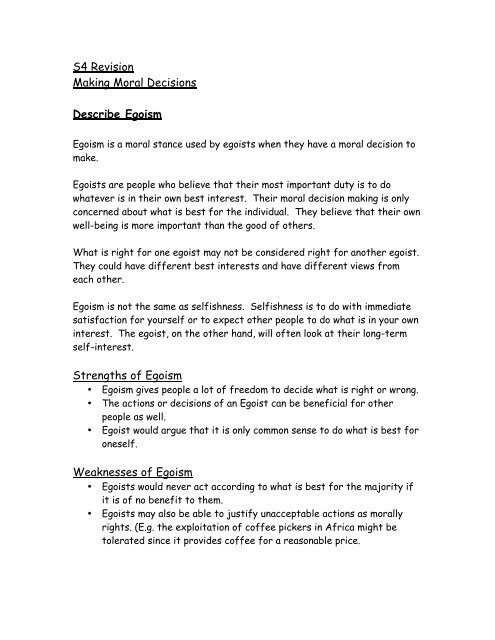Strengths of Egoism Weaknesses of Egoism
Making Moral Decisions Assessment 1
Making Moral Decisions Assessment 1
- No tags were found...
You also want an ePaper? Increase the reach of your titles
YUMPU automatically turns print PDFs into web optimized ePapers that Google loves.
S4 Revision<br />
Making Moral Decisions<br />
Describe <strong>Egoism</strong><br />
<strong>Egoism</strong> is a moral stance used by egoists when they have a moral decision to<br />
make.<br />
Egoists are people who believe that their most important duty is to do<br />
whatever is in their own best interest. Their moral decision making is only<br />
concerned about what is best for the individual. They believe that their own<br />
well-being is more important than the good <strong>of</strong> others.<br />
What is right for one egoist may not be considered right for another egoist.<br />
They could have different best interests and have different views from<br />
each other.<br />
<strong>Egoism</strong> is not the same as selfishness. Selfishness is to do with immediate<br />
satisfaction for yourself or to expect other people to do what is in your own<br />
interest. The egoist, on the other hand, will <strong>of</strong>ten look at their long-term<br />
self-interest.<br />
<strong>Strengths</strong> <strong>of</strong> <strong>Egoism</strong><br />
• <strong>Egoism</strong> gives people a lot <strong>of</strong> freedom to decide what is right or wrong.<br />
• The actions or decisions <strong>of</strong> an Egoist can be beneficial for other<br />
people as well.<br />
• Egoist would argue that it is only common sense to do what is best for<br />
oneself.<br />
<strong>Weaknesses</strong> <strong>of</strong> <strong>Egoism</strong><br />
• Egoists would never act according to what is best for the majority if<br />
it is <strong>of</strong> no benefit to them.<br />
• Egoists may also be able to justify unacceptable actions as morally<br />
rights. (E.g. the exploitation <strong>of</strong> c<strong>of</strong>fee pickers in Africa might be<br />
tolerated since it provides c<strong>of</strong>fee for a reasonable price.
Describe Religious Authority<br />
When religious people are faced with making moral decisions they rely on the<br />
teachings <strong>of</strong> their faith. They try to find some answers or guidelines in<br />
their holy books or they try to find out what their religious leaders have to<br />
say about the issue a religious person has to be decided upon.<br />
Religious people will make decisions based on their faith as they want to<br />
please God in all their actions in life. They believe this will be best for them<br />
in this world and in any existence after death.<br />
<strong>Strengths</strong> <strong>of</strong> Religious Authority<br />
• Teachings <strong>of</strong> a religious authority will decide on what is best for the<br />
whole <strong>of</strong> the community and not just the individual.<br />
• Religious people will usually find it easy to make a decision on moral<br />
issues since their religious authority gives them clear guidance on such<br />
issues.<br />
Weakness <strong>of</strong> Religious authority<br />
• A religious person may not have the same freedom or choice as a nonreligious<br />
person when deciding about a moral issue. This can also lead<br />
to a lack <strong>of</strong> flexibility in responding to moral issues.<br />
Explain the Importance <strong>of</strong> Moral Stances<br />
Moral Stances are important because:<br />
We make our decisions in life according to our moral stances<br />
These moral stances are things we believe in<br />
They guide us in all our decision-making<br />
They help us to understand other people’s point <strong>of</strong> view




